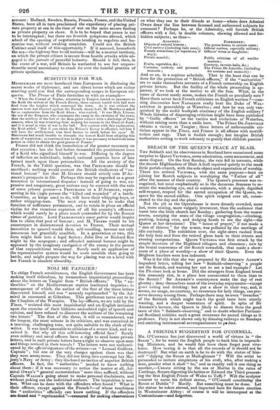SUBSTITUTES FOR WAR.
MIISSULMANS are more barefaced than Europeans in disclosing the secret works of diplomacy, and use direct terms which are rather startling until you find the corresponding usages in European eti- quette. The Presse of Paris furnishes us with an example-
" Wben the Consul of Naples, returning to Tangier, landed to announce to the Raid the arrival of the French Envoy, three cannon loaded with hall were fired from the heights which command the town. As it was evident the cannon were not directed against the French steam-boat, M. Martineau asked for an explanation from the Kaid Abou ; who replied, It was Moly Lliman, the son of the Emperor, who commands the camp in the environs of the town, that the artillery of the fort of the Renegades saluted with a discharge of three cannon, when he was returning from making his rounds in the Oued-el-Joud ; and it is usual in time of war to fire ball.' Not content with this explanation, the Raid added, ' But if you think the Prince's Envoy is offended, tell him I will have the artillerymen who fired beaten to death before his eyes.' M. 3Iariineau had much trouble to dissuade the honest Raid from adopting this mode of reparation ; so convinced was he that it was necessary to bastinado some person in order to obtain the good graces of France."
France did not think the immolation of the gunner necessary on that occasion ; but she had before demanded the punishment even of a Kaid who signalized himself in war. Differing in the degree of infliction on individuals, indeed, national quarrels have of late turned much upon these personalities. All the anxiety of the French, in the Tahiti question, was that PRITCHARD should be sacrificed ; nothing would content the British vindicators of "na- tional honour" but that M. Guizox should utterly ruin D'Au- BIGHT'S prospects in life. Perhaps this may be regarded as a great invention in international disputes : instead of going to war, ex- pensive and sanguinary, great nations may be content with the ruin of some private person—a PRITCHARD or a D'Aumnriv, repre- senting in his Lingle person the "killed and wounded" of a battle. Countries, as kings used to do, will have their whipping-boys, or rather whipping-men. The next step would be to make that function of sufferance permanent, and to retain in place an official victim for the vicarious expiation of all his country's offences ; which would surely be a place much contended for by the Roman virtue of patriots. Lord PALMERSTON'S amor patrie would inspire him to claim that post of honour ; and M. TRIERS would be his counterpart in disinterested devotion to France. Their mutual incentives to quarrel would then, self. recoiling, become not only innocuous but gracefully unselfish. In a generation or two, this form might fade into a legal fiction ; John Doe or Richard Roe might be the scapegoat ; and offended national honour might be appeased by the imaginary castigation of the enemy in the person of that supposititious trespasser. Surely such an application of the representative system would be more sensible than going to battle, and might prepare the way for placing war on a level with law French in obsolete absurdity.


























 Previous page
Previous page